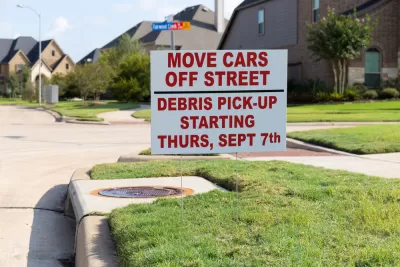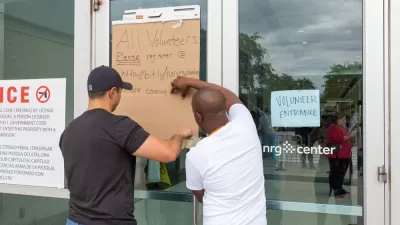The planning legacy of Hurricane Harvey is becoming more clear in Houston, after the city released its first-ever Houston Climate Action Plan, just months after releasing the Resilient Houston plan.

Mayor Sylvester Turner and the City of Houston’s Office of Sustainability released the Houston Climate Action Plan on Earth Day, setting a target to meet the Paris Climate Accord's goals for greenhouse gas emissions reductions by 2050.
"The Houston Climate Action Plan is a critical part of Mayor Turner’s Hurricane Harvey recovery effort and builds upon Resilient Houston, the city’s recently released resilience strategy, which identified climate change as a key threat to the city’s future," according to a press statement released by the Houston Mayor's Office on April 22.
For a city that's home to numerous powerful oil industry players, the city of Houston has a track record of leadership on deploying climate-friendly actions in the municipal operations of the city. As detailed in the press release:
Since 2005, the City has reduced municipal emissions by 37%, through building efficiency upgrades, investing in renewable energy, and converting to hybrid, electric, and alternate fuel vehicles. For the past six years, Houston has been the number one municipal user of renewable energy by the EPA and today powers 92% of municipal facilities with renewable energy. The City is a member of C40, a network of the world’s megacities committed to addressing climate change, and Mayor Turner co-chairs Climate Mayors, a bipartisan network of almost 450 U.S. mayors demonstrating leadership on climate action.
Dylan McGuinness provides news coverage of the new Climate Action Plan for the Houston Chronicle, headlining a lack of fanfare surrounding the announcement but also summarizing some of the more ambitious goals of the plan:
Houston’s first Climate Action Plan calls on the city’s 4,600 energy companies to lead the transition to renewable sources, while residents are asked to swap car rides for mass transit and work to cut down on the estimated seven pounds of waste each person discards every day.
The plan also calls for the city to adopt a new building code and develop a long-range plan for its waste collection system as part of a broad-based effort to reach carbon neutrality by 2050.
FULL STORY: Without fanfare, Houston unveils Climate Action Plan, shooting for carbon neutrality by 2050

Alabama: Trump Terminates Settlements for Black Communities Harmed By Raw Sewage
Trump deemed the landmark civil rights agreement “illegal DEI and environmental justice policy.”

Study: Maui’s Plan to Convert Vacation Rentals to Long-Term Housing Could Cause Nearly $1 Billion Economic Loss
The plan would reduce visitor accommodation by 25% resulting in 1,900 jobs lost.

Planetizen Federal Action Tracker
A weekly monitor of how Trump’s orders and actions are impacting planners and planning in America.

Wind Energy on the Rise Despite Federal Policy Reversal
The Trump administration is revoking federal support for renewable energy, but demand for new projects continues unabated.

Passengers Flock to Caltrain After Electrification
The new electric trains are running faster and more reliably, leading to strong ridership growth on the Bay Area rail system.

Texas Churches Rally Behind ‘Yes in God’s Back Yard’ Legislation
Religious leaders want the state to reduce zoning regulations to streamline leasing church-owned land to housing developers.
Urban Design for Planners 1: Software Tools
This six-course series explores essential urban design concepts using open source software and equips planners with the tools they need to participate fully in the urban design process.
Planning for Universal Design
Learn the tools for implementing Universal Design in planning regulations.
Caltrans
Smith Gee Studio
Institute for Housing and Urban Development Studies (IHS)
City of Grandview
Harvard GSD Executive Education
Toledo-Lucas County Plan Commissions
Salt Lake City
NYU Wagner Graduate School of Public Service





























